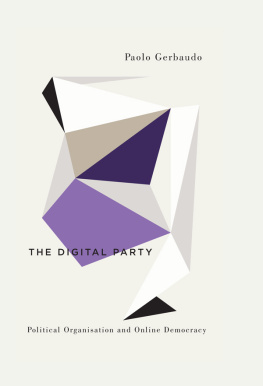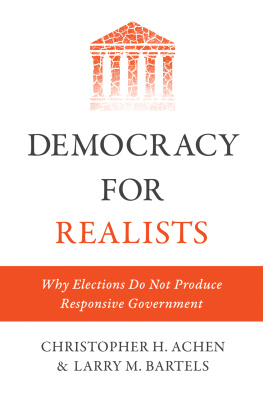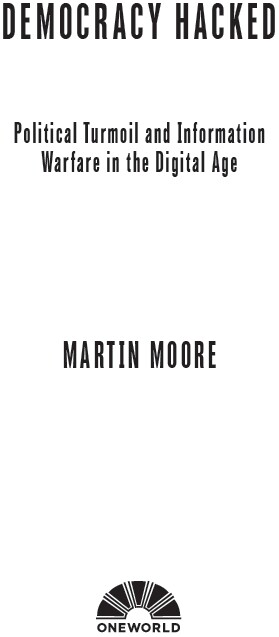
To Jojo
Contents
Introduction
There is a washed-out old colour photograph, taken in autumn 1974, of my family sitting in an orange Triumph convertible. I am sitting in the back seat, aged four, wearing a Davy Crockett hat, looking chilly and a little grumpy. My dad and my elder sister are squeezed in the back with me, while my baby brother is sitting on my mums lap in the front passenger seat. Stuck on the door of the car is my dads campaign poster for the upcoming general election. It was his second as a candidate his first having been only seven months earlier and we were out leafleting, door-knocking and canvassing constituents. I cannot imagine I was much help but, over the course of the campaign, my dad was determined to knock on every door in the constituency. When or rather if someone opened it, he would make his pitch and hear what they wanted from a candidate. The script, if you could call it that, was his own, and the only help and direction he received from central office was a national campaign guide, containing a list of general policy statements from the party.
That world is coming to an end. This is not meant as a sort of The End is Nigh sandwich board slogan. But the democracy of long-established, rigidly hierarchical, centrist parties is collapsing. The idea that we should entrust the job of informing people about news and politics to an exclusive group of news outlets is disappearing. The concept of sporadic political representation through occasional elections is losing its legitimacy. And, the idea that we could ignore politics most of the time and be ignored in return is fading into a sepia past.
Almost half a century on, political campaigning is virtually unrecognizable. Official campaigns are powered centrally by mountains of voter data, run through complex algorithmic models, and used to micro-target messages to the most sought-after voters. You are no longer an anonymous resident of 43 Belvedere Avenue. You are known by hundreds of data points that capture what you buy, what you earn, what you read, what you watch, who you know and what you care about. Merge this with campaign survey data and a candidate will know whether to lavish you with attention, appeal to you for a donation, or perhaps even discourage you from going out to vote. Unofficial campaigns those fought by wealthy individuals and organizations, by pressure groups and by us, the great unwashed public have changed even more. We all now have access to such an arsenal of digital tools that we can take up arms and fight for our own message on the same battlefield.
Already, Donald Trumps victory in 2016 has been written off by some as a peculiar confluence of circumstances, a freak black-swan event that will not be repeated. But political surprises are becoming the norm. Before the election of Donald Trump there was Narendra Modis Indian landslide in 2014, Rodrigo Dutertes shock win in the Philippines in May 2016 and the Brexit vote a month later. After Trump there was Emmanuel Macrons ascension in 2017, Jeremy Corbyns double-digit swing in the UK election the same year and M5Ss rise to dominance in Italy in 2018. You might say there are good material reasons for peoples anger at the political establishment and frustration with the neo-liberal global financial order. Or that these surprises are an ongoing response to the global economic rupture of 2008, and the twin spectres of climate change and mass migration. But there has been similar anger and frustration before, with much more predictable political outcomes. No, these political surprises and there will be more cannot be understood without recognizing the fundamental transformation of our communications environment.
The revolution in digital communications the collapse of news media and the rise of dominant tech platforms like Google, Facebook and Twitter is buffeting our elections, capsizing conventional candidates and drowning centrist parties. More than that, it is restructuring our politics, undermining existing institutions and remaking the role of the citizen. It is creating openings for those who previously had none, space in which to sidestep norms, rules and established practices, and opportunities for gaming and distortion. If we are to have any chance of determining the type of political system that will emerge from this maelstrom, then we need to start by trying to understand it.
The political upheavals of 2011 were the first proper sign of the scale of disruption, though democratic governments drew the wrong conclusions from them. Across North Africa and the Middle East, citizens used digital tools like Facebook and Twitter to incubate protest and coordinate collective action against authoritarian and autocratic governments. Watching these revolutions unfold, democratic governments, and those running the digital platforms, congratulated themselves. Their mistake was to assume that their tools were inherently democratizing, when technology was simply enabling new ways of pursuing political ends. Those who saw how politically powerful these platforms could be, and used digital tools to pursue their political aims, benefited disproportionately. It did not matter if these aims were democratic, autocratic or anarchistic.
Authoritarian governments, scared to death by what happened that year, took a very different lesson from the Arab Spring, and sought to tame and domesticate the net. In Russia, Vladimir Putins government looked to impose digital sovereignty, requiring that all personal data of Russian citizens be held within Russia, and forcing all blogs with a readership of over three thousand visitors a day (not much bigger than a decent Instagram account) to register as regulated media organizations. In Iran, President Rouhani set about building a national internet, complete with its own government-approved domestic sites, the first stage of which was completed by the end of 2017. The Chinese government already had the Great Firewall and Great Shield to police the net, but extended and deepened its methods of control, experimenting with even more invasive systems like Social Credit.
The year 2016 should have been our wake-up call. Our old democratic systems are just as prone to being gamed. This is not a partisan political point, though some will undoubtedly interpret it as such. What became clear in 2016 was that those who consciously sought to upend the status quo, and who used digital tools to do so, had far greater success than they would have had at any other point over the previous half century. This is why the three types of hackers who successfully distorted the 2016 US election individuals, plutocrats and foreign states ought to be seen not as anomalies, but as models for what is coming next. Seeing them as models allows us to understand how they did what they did, what helped them do it, and how others can do the same, whether this means deploying memetic warfare tools, amassing vast voter data sets, developing sophisticated behavioural targeting methods, or poisoning the democratic well with false information. These methods, like the digital ecosystem generally, are not unique to any particular political persuasion, though they work better for those at the extremes than those in the centre, for those wanting to transgress political principles and conventions, and for those willing to ignore ethical norms.
None of the hackers could have done what they did had politics not migrated online. We get our political information online, we join and like political campaigns online, we donate to political causes online, we sign online petitions, and some of us even vote online. We have already seen the first campaign in the UK to put almost all [of its] money into digital communication, according to the director of the UKs official Vote Leave campaign after the 2016 Brexit referendum. It is rare now to find a political consultancy that does not sell itself on its data, digital and social media skills. Cambridge Analytica achieved global infamy for the amount of digital personal data it collected and used to target voters, but it was hardly unique.
Next page
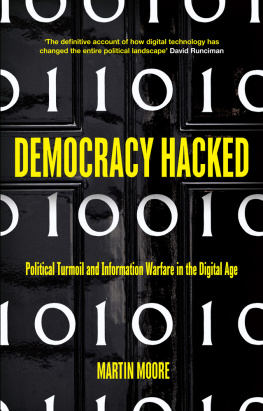
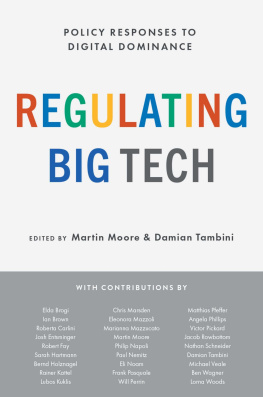

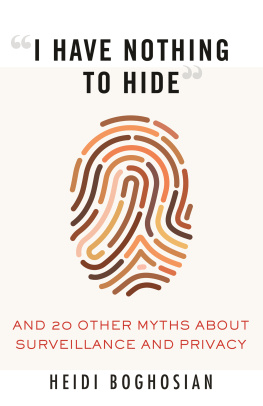
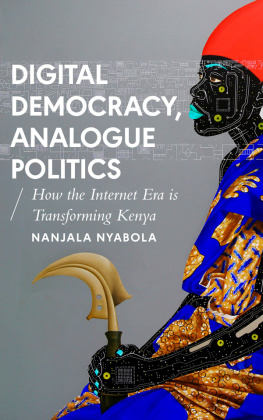
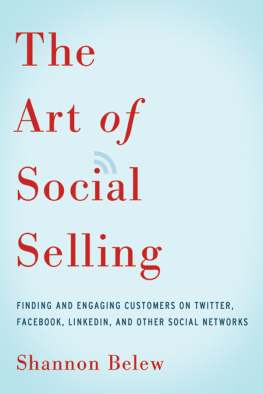
![switching.social [switching.social] - The Switching Social Handbook](/uploads/posts/book/131346/thumbs/switching-social-switching-social-the-switching.jpg)
